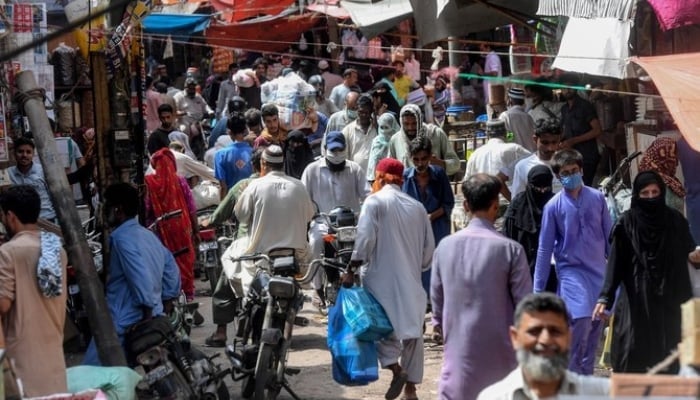This is a real threat to Pakistan that no one wants to talk about. I can only hope that someday we might wish to pay attention to our own troubles instead of solving the rest of the world's problems.
Data shared by the Pakistan Bureau of Statistics suggests that the current rate of population growth in the country is likely to double the population by 2050. Federal Minister for Planning, Development and Special Initiatives,...

www.geo.tv
Pakistan's population likely to double by 2050
Population growth adversely affects per capita income and standard of living of citizens in the country
By
APP
Web Desk
July 18, 2024
Residents shop at a wholesale market in Karachi, Pakistan on June 10, 2020. — AFP/File
Data shared by the Pakistan Bureau of Statistics (PBS) suggests that the current rate of population growth in the country is likely to double the population by 2050.
Federal Minister for Planning, Development and Special Initiatives, Professor Ahsan Iqbal on Thursday unveiled the “First Ever Digital Census Key Findings Report”, compiled by the PBS.
The report, which marks a significant milestone for Pakistan, provides comprehensive data crucial for the development of urban and rural areas and effective disaster response.
According to the detailed results of the 7th Population and Housing Census-2023, Pakistan is the 5th most populous country in the world with a total population of 241.49 million with all the provincial capitals' most populous cities.
The census data shows that the current population growth rate is 2.55% which is the highest in the region and if it continues, the country's population will be doubled by 2050.
As per the stats, Karachi is ranked the 1st most populous city with a population of 20.4 million while the Sindh province’s count stands at 55.70 million.
Meanwhile, Lahore is the 2nd most populous city with 13 million and the provincial population count stands at 127.69 million.
Peshawar ranks 3rd with 4.76 million Khyber Pakhtunkhawa’s population is 40.86 million, while Quetta ranks 4th with 2.59 million and 14.89 million for the provincial population count in Balochistan.
The federal capital of Islamabad’s population count stood at 2.36 million.
The census data shows that the total population of the country, 241.49 million, is represented by 51.48% males and 48.51% females, with a gender ratio of 106.12.
The average number of members in a Pakistani family is 6.30 while the dominant religion is Islam representing 96% of the population.
The age-wise enumeration of the population shows 36.47 million people under five years, 97.53 million under 15 years, 62.58 million between 15 to 29 and 190.27 million below 40 years of age.
Meanwhile, the literacy indicators show 61% of Pakistan's population aged ten years and above is literate.
As per the PBS data, population growth is adversely affecting the per capita income and standard of living of citizens. There is a need to develop an effective strategy for population control for better distribution of resources and economic prosperity.
Addressing a ceremony, the minister highlighted Pakistan’s achievement as the first country in South Asia to conduct a digital census.
“The data collected through this census will be instrumental in guiding our development efforts and enhancing our ability to respond to natural calamities,” he stated.
The census, mandated by the Constitution to be conducted every ten years, faced scrutiny in 2017 when the Sindh government expressed concerns over the results, he said.










